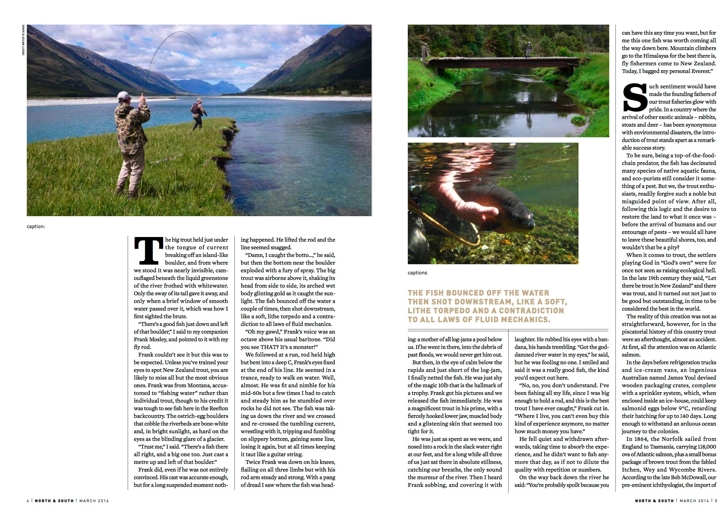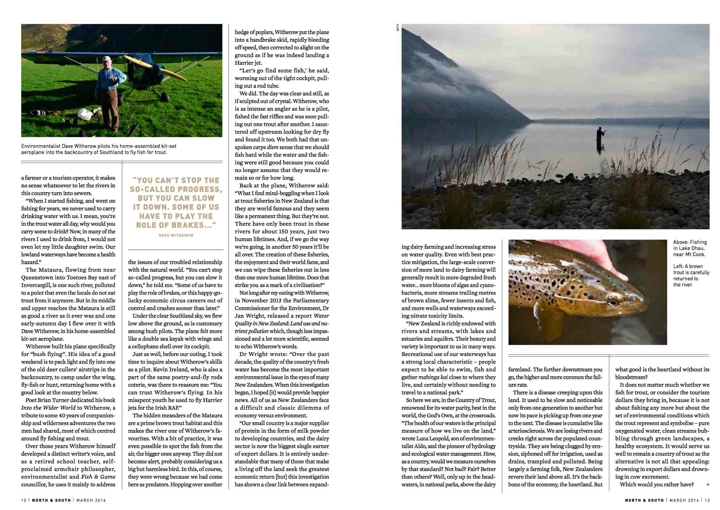My story Saving Trout Country, about trout and water quality in New Zealand, is in the March issue of North & South Magazine.
Have a read and join the groundswell!
The big trout held just under the tongue of current breaking off an island-like boulder and from where we stood it was nearly invisible, camouflaged beneath the liquid greenstone of the river frothed with whitewater. Only the sway of its tail gave it away, and only when a brief window of smooth water passed over it, which was how I first sighted the brute.
“There’s a good fish just down and left of that boulder,” I said to my companion Frank Mosley, and pointed to it with my fly rod.
Frank couldn’t see it but this was to be expected. Unless you’ve trained your eyes to spot New Zealand trout, you are likely to miss all but the most obvious ones. Frank was from Montana, accus- tomed to “fishing water” rather than individual trout, though to his credit it was tough to see fish here in the Reefton backcountry. The ostrich-egg boulders that cobble the riverbeds are bone-white and, in bright sunlight, as hard on the eyes as the blinding glare of a glacier.
“Trust me,” I said. “There’s a fish there all right, and a big one too. Just cast a metre up and left of that boulder.”
Frank did, even if he was not entirely convinced. His cast was accurate enough, but for a long suspended moment nothing happened. He lifted the rod and the line seemed snagged.
“Damn, I caught the botto…,” he said, but then the bottom near the boulder exploded with a fury of spray.
The big trout was airborne above it, shaking its head from side to side, its arched wet body glinting gold as it caught the sun- light. The fish bounced off the water a couple of times, then shot downstream, like a soft, lithe torpedo and a contra- diction to all laws of fluid mechanics.
“Oh my gawd,” Frank’s voice was an octave above his usual baritone. “Did you see THAT? It’s a monster!”
We followed at a run, rod held high but bent into a deep C, Frank’s eyes fixed at the end of his line. He seemed in a trance, ready to walk on water. Well, almost. He was fit and nimble for his mid-60s but a few times I had to catch and steady him as he stumbled over rocks he did not see. The fish was tak- ing us down the river and we crossed and re-crossed the tumbling current, wrestling with it, tripping and fumbling on slippery bottom, gaining some line, losing it again, but at all times keeping it taut like a guitar string.
Twice Frank was down on his knees, flailing on all three limbs but with his rod arm steady and strong. With a pang of dread I saw where the fish was head-ing: a mother of all log-jams a pool below us. If he went in there, into the debris of past floods, we would never get him out.
But then, in the eye of calm below the rapids and just short of the log-jam, I finally netted the fish. He was just shy of the magic 10lb that is the hallmark of a trophy. Frank got his pictures and we released the fish immediately. He was a magnificent trout in his prime, with a fiercely hooked lower jaw, muscled body and a glistening skin that seemed too tight for it.
He was just as spent as we were, and nosed into a rock in the slack water right at our feet, and for a long while all three of us just sat there in absolute stillness, catching our breaths, the only sound the murmur of the river. Then I heard Frank sobbing, and covering it with laughter. He rubbed his eyes with a ban- dana, his hands trembling. “Got the god- damned river water in my eyes,” he said, but he was fooling no one. I smiled and said it was a really good fish, the kind you’d expect out here.
“No, no, you don’t understand. I’ve been fishing all my life, since I was big enough to hold a rod, and this is the best trout I have ever caught,” Frank cut in. “Where I live, you can’t even buy this kind of experience anymore, no matter how much money you have.”
He fell quiet and withdrawn after- wards, taking time to absorb the expe- rience, and he didn’t want to fish any- more that day, as if not to dilute the quality with repetition or numbers.
On the way back down the river he said: “You’re probably spoilt because you
can have this any time you want, but for me this one fish was worth coming all the way down here. Mountain climbers go to the Himalayas for the best there is, fly fishermen come to New Zealand. Today, I bagged my personal Everest.”
Continue reading in the March 2014 issue of the magazine or get the online version here



